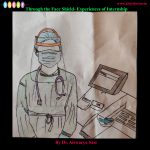 There are many, many things they don’t teach you in medical school which are essential to life after medical college. Things like the travails of the stock market; when, where and how much to invest; when to make career moves like shifting to another country. Imagine during internship, there was a two week posting wherein interns could get to know how to work in different countries- the licensing exams, the expected salary structure, the problems and so on. That would be fun.
There are many, many things they don’t teach you in medical school which are essential to life after medical college. Things like the travails of the stock market; when, where and how much to invest; when to make career moves like shifting to another country. Imagine during internship, there was a two week posting wherein interns could get to know how to work in different countries- the licensing exams, the expected salary structure, the problems and so on. That would be fun.
But unfortunately, this article is not about any of that. Its about another matter which is not taught in medical school- communication. Not the communication of findings between doctors but between doctors and their patients. Let me start with a small quiz. Imagine you are in the ICU and as you are leaving for the day, the attenders of patient approach you with the question: How is he?
He’s not likely to make it. So your answer is:
1. You can talk to the doctor on duty
2. Please check with the nurse in charge
3. We can’t say anything till the next 24 hours
4. ————— (left blank to signify silence during which you look away and walk past)
5. ————– (left blank to fill in your answers, because I have run out of options)
I wonder how many of us can be truthful and say- Its bad; he will die. Is there another way of saying that?
Apparently, as one of my friends working in the UK told me, the concerned attender or patient can complain to the NHS about that.
 So what do we do? I don’t think there is any right answer. Because we are not trained for it. We are trained for recognising signs and symptoms, diagnosing and treating. But not for the talking to patients. Its so much easier to diagnose a cancer as incurable, stage the disease and estimate the five year survival than to tell all this to the concerned patient. As we progress further into the field of medicine, the danger of losing the point of origin becomes all the more real. That point of origin was to help others and to ease their pain.
So what do we do? I don’t think there is any right answer. Because we are not trained for it. We are trained for recognising signs and symptoms, diagnosing and treating. But not for the talking to patients. Its so much easier to diagnose a cancer as incurable, stage the disease and estimate the five year survival than to tell all this to the concerned patient. As we progress further into the field of medicine, the danger of losing the point of origin becomes all the more real. That point of origin was to help others and to ease their pain.
Unfortunately, all of us learn that the hard way. When we grope for words to tell someone he or she has less than five years to live.
Communication with patients is not always easy. Patients usually assume that we as doctors can recognise one of them at short notice when we see them outside the hospital. I would like to illustrate this with a small parable.
I had gone to deposit money in a bank, close to the hospital I was working in Kerala. Next to the counter, stood a man clad in white lungi and white khadi shirt. He leered at me. I did the best thing- ignored him. He declared’ “Can’t have anything cold.”
It sounded like one of those matrimonial ads- Must Love Cats and such stuff. But the chap was definitely talking to me. I did the next best thing- answered him. “Nothing?”
“Nothing!” he replied with complete confidence.
I had some vague recollection that he had come to the hospital. Fishing for details, I asked’ “What happens?”
“Same problem!”
“Same?”
“Same!”
“What about lime juice?” I asked, having absolutely no idea about anything.
“Same problem.”
I cast a sly look at the cashier. This was probably the most interesting thing he had encountered since they had put him in his cage and told him to count money. He had abandoned all attempts at counting my cash. He had ordered some tea, rolled up his newspaper and was watching the day’s entertainment right in front of him.
“What about mango juice?” I ploughed on, determined to go through every single fruit in the plant kingdom and some in the animal kingdom as well until one of us collapsed of sheer boredom.
“Every juice!” My friend did not seem to be willing to explore my knowledge of the local flora and fauna. “Now we are trying Ayurveda.”
“Of course! Some say that for some diseases that is the best thing.”
“Yes. Sometimes English medicine has limitations.”
Being a leading exponent of English medicine, I felt I had to say something in its defence. “I agree. Ayurveda has no side effects.” There is a time and place to say things also.
Those apparently were the magic words. He had a silent orgasm at the words- side effects- and was rendered speechless. The cashier apparently was also stunned and lost his count.
Pressing my advantage, I asked, “So how is it now?”
“Much better. She is sleeping better at night. Wheeze has reduced a lot.”
The gates were opened, the lights came on and I knew. It wasn’t for him but his wife  that they had come to the hospital one dark and stormy night (as most are). It had been at some two or three in the AM and I had been roused from deep coma. It was a miracle that I remembered this much. Usually in that state of mind, I find it difficult to remember to change my pajamas and exit through the right door and remember to do it in that order. But anyway, now I knew.,
that they had come to the hospital one dark and stormy night (as most are). It had been at some two or three in the AM and I had been roused from deep coma. It was a miracle that I remembered this much. Usually in that state of mind, I find it difficult to remember to change my pajamas and exit through the right door and remember to do it in that order. But anyway, now I knew.,
I asked some cursory questions and that was that. The man turned to the cashier and said, “The doctor remembers everything!”












